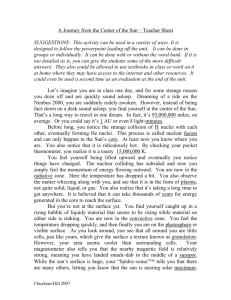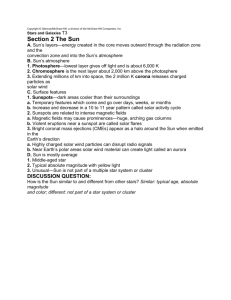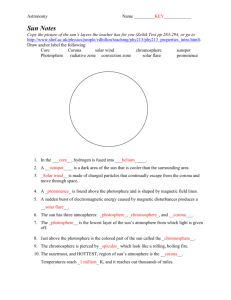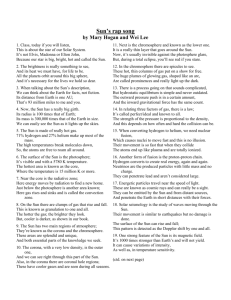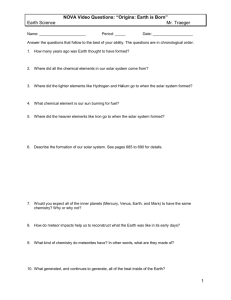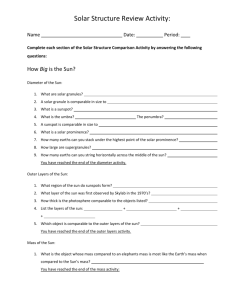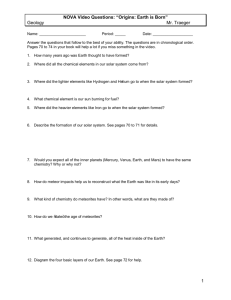Sun PPT -- high level - Mentor Public Schools
advertisement
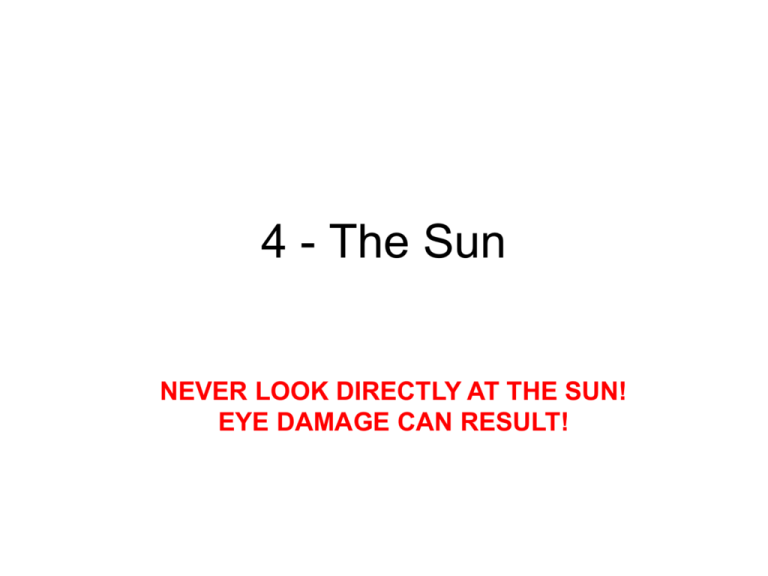
4 - The Sun NEVER LOOK DIRECTLY AT THE SUN! EYE DAMAGE CAN RESULT! Major Regions: Interior (“Inner-sphere”) •Core •Radiative Zone •Convective Zone Atmosphere (“Outer-sphere”) •Photosphere •Chromosphere •Corona No real “surface” - it is gaseous all the way to the center! Basic Facts: Mass M = 2x1030 kg = 300,000M Radius R = 7x108 m = 7x105 km = 111R Mean Density = Mass/Volume = M/((4/3)R3)= 1400 kg/m3 = 1.4 g/cm3 Distance = 1.5x1011 m = 1.5x108 km = 8.3 light-minutes Luminosity L = 3.9x1026 W (Solar Constant = 1350 W/m2) Mean Surface Temperature = Teffective = 5780 K Composition By Mass By Number H ~68% ~90% He ~31% ~10% ~1% ~1% “Heavies” ATMOSPHERE (general) Photosphere - “sphere of light” - Taverage = Teff ~ 5780 K ~1000 km across Few X 100 Km thick Granulation - light & dark regions in photosphere •upwelling is hotter & brighter •downwelling is cooler & darker •Flowing motion “convection” Also see “supergranulation” Surface pulsations - 5 min - 1 hr (measured via Doppler Effect) Limb Darkening The photosphere is hotter as you go deeper We see deeper when looking at the center of the “disk” Brightness increases as T4 (Stefan-Boltzmann Law!) Chromosphere - “sphere of color” - T drops to ~ 4300 K When seen edge-on we see the 656.3 nm Balmer line H This is where Helium was discovered (Helios - Greek god of the Sun) Special H filter used to image whole Sun Solar Spectrum Kirchhoff’s Laws… Corona - T rises to ~ 500,000 - 1,000,000 K !! Highly ionized atoms, such as Fe+13 (also called Fe XIV)* Light scattered by ions & electrons (inner) & dust grains (outer) Heated by complex magnetic/particle activity C0 C I C+1 C II *NOTE: spectroscopists use a special notation: C+2 C III C+3 is C IV Solar Wind Outer atmosphere is flowing away from the Sun - the solar wind Speeds up to few million km/hr Earth is inside the solar wind! At Earth: V = 400 - 700 km/s T = 50,000-500,000 K* density = 103 - 104/m3 (Earth @ sea level - ~2.5x1025/m3) Solar wind expands outward, creating the heliosphere * Why don’t we cook? Listen to Voyager 1 crossing “dense” regions here The Active Sun Sunspots: •Appear in groups •T~4000-4500 K •Darker than surrounding photosphere (WHY?) •Large magnetic fields inhibit convection umbra penumbra note polarity reversed in N and S magnetic field Solar Cycle: Number of spots = ~ 11 yrs Latitude of spots = ~ 11 years Magnetic polarity of spots = 22 years (to return to starting orientation) Horace Babcock Magnetic Dynamo via differential rotation But the cycle seems to be getting shorter! Effects on Earth’s Climate What fraction of global warming is due to the Sun? cosmic rays can induce cloud formation & cover cloud chambers Maunder Minimum (1645-1715) & “Little Ice Age” Can lead to errors in radio-carbon dating See Wikipedia for more on the "Little Ice Age" cycle seen in sedimentary rock samples 650 million yrs old - due to variations in deposition of glacial meltwater Plages - heated by rising magnetic field - compresses gas Filaments - cool streamers of gas above photosphere Prominences filaments seen from the side Flares - sudden release of energy equal to 100s of millions of megatons radio through gamma rays! Temperatures exceed 10 million K A couple (here & here) of nice movies from the Big Bear Solar Observatory Magnetic field loops trap hot gas, area bright in X-rays Open fields - gas flows & area is dark in X-rays - coronal holes Look at this with 3D glasses (redgreen) - from Yohkoh spacecraft Coronal Mass Ejections Expel trillions of tons at hundreds of km/s! Potential damage to: •satellites & astronauts •power grids •radio communication etc. QuickTime™ and a YUV420 codec decompressor are needed to see this picture. INTERIOR Sun produces 4x1026 W for 4x109 yrs. How? •Chemical - would last only 104 yrs •Gravitational - would last 25-50x106 yrs •Thermonuclear - can last 1010 yrs! 1905 - Einstein finds that matter & energy are different aspects of the same thing - E=mc2 1920’s - Eddingtom calculates that the core of the Sun must have T ~ millions K, and proposes some type of atomic/nuclear process fuels the Sun’s energy Atkinson suggests it is fusion of H into He 1 kg H 0.993 kg He + ENERGY equivalent to the missing 0.007 kg (i.e. 0.7% of the original amount) - this is equivalent to burning 6000 tons of chemical fuel! L = 3.9x1026 W 4.3x109 kg/s lost 6x1011 kg/s H He IF THE SUN COULD USE ALL OF ITS H FUEL: fuel supply 2x10 30 kg 1yr 9 Lifetime 100x10 yrs 11 1 7 1 rate of fuel use 6x10 kg s 3.6x10 s yr Later, we will see that the Sun will only be able to tap ~10% of its mass, but that’s still 10 billion years! proton-proton chain CNO cycle Proton-proton chain in detail…… PPI (91% of time) PPII (8% of time) A B C 3 4 7 D He He Be E 7 Be e 7 Li e F 7 Li 1H 8 Be* G PPIII (1% of time) H 1 H 2 H e e e e 2 H 1H 3 He 3 He 3 He 4 He 2 1H 1 H I J 8 Be* 2 4 He excited state * Be 1H 8 B 8 B 8 Be* e e 8 Be* 2 4 He 7 CNO Cycle A B C 1H 13 N * 13 * N 13C e e 13 C 1H 14 N 14 N 1H 15O 15 O 15 N e e 15 N 1H 12C 4 He 12 SOLAR INTERIOR MODELS Mathematical descriptions of what the Sun should be like inside Hydrostatic Equilibrium - balance of gravity & pressure Thermal Equilibrium - balance of heat energy everywhere Energy Transport (how does it get from the core to the surface? •conduction - direct transfer through physical contact •convection - transfer of energy through fluid motion •radiation - transfer via photons Equation of State - relates pressure, density, temperature Opacity - how photon transfer are affected by the gas Energy Generation - energy production vs. temperature, density, etc. “Boundary Conditions” - L, M, R, etc. to look like a real star! Results: Tc~15x106K, Pc~3x1011 Atm, density c~160 g/cm3 !! The Standard Solar Model (SSM) Solar Neutrino Problem pp chain produces neutrinos The measured rate of neutrinos is 1/3-1/2 that predicted by SSM Something is wrong……….. •Experiments? - but many give similar “wrong” results •Solar Models? - helioseismology says “probably not” •New physics? - who asked for that? Helioseismology to the Rescue! Measured Oscillation Modes - Global Oscillation Network Group (GONG) Convection deeper than once thought Differential rotation goes deep! But SSM not endangered The Experiments Ray Davis Homestake Mine - looks for from pp III 37 Cl e 37 Ar e - gets 1/3 predicted value pp III very sensitive to T Experiment only measures 1 “flavor” of - the “electron ” What if ’s change in flight???? Super-K - gets about 1/2 the predicted amount Sudbury Neutrino Observatory (SNO) - sensitive to all “flavors” - agrees with SSM!! Sun only makes electron ’s SNO Results show: We detect ~1/3 of electron ’s predicted by SSM We detect TOTAL number of predicted by SSM 2/3 of the electron ’s were converted into other flavors before they reached Earth (so the total number is conserved) Requires revising “standard physics” of subatomic particles - New Physics!
